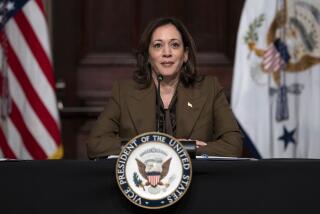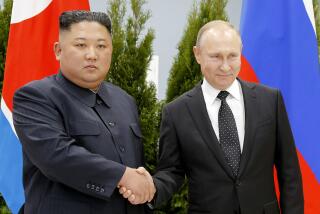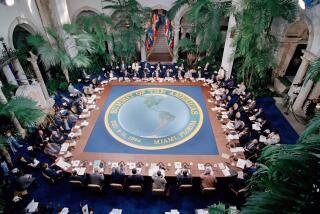Reagan May See Gorbachev in ‘Non-Summit’
- Share via
SANTA BARBARA — President Reagan is willing to sit down with Soviet leader Mikhail S. Gorbachev for a meeting short of a full-scale summit, and the Soviets say they are open to this possibility as well, the chief White House foreign policy adviser said Wednesday.
Robert C. McFarlane, the President’s national security adviser, said that such a meeting could come at the annual session of the U.N. General Assembly this September or at the 40th anniversary observance of the founding of the United Nations in October.
This marks the first time that the Reagan Administration has distinguished between a summit and a lesser meeting between Gorbachev and the President. To most people, the distinction might be a matter of semantics, but to Reagan and his strategists there is a sharp difference: A summit tends to generate greater expectations, they believe.
Lower Expectations
“For a meeting, you shouldn’t have high expectations,” McFarlane told reporters. He called a meeting “useful” because it would give Reagan and the Soviet leader a chance to get “to know each other,” as well as each other’s interests, priorities and commitments to resolving U.S.-Soviet problems.
The President, McFarlane said, “is open to a meeting now, and he believes that we should press on with an agenda that can lead to a summit.” McFarlane added that the Soviets “have said that they are open to a meeting and think that it would be worthwhile. . . .
“I think that they are open to either a meeting or a summit.”
A senior Administration official, speaking on the condition that he remain anonymous, said the President sees three types of potential get-togethers between the superpower leaders.
One might be little more than a “get-acquainted” session. The second could be a carefully prepared and substantive summit serving as “a benchmark” for what progress lower-level negotiators had achieved in settling differences between the two countries.
Use of Opportunity
The third could be something in between that “takes advantage of a ceremonial event.”
It is the last type of meeting that Reagan and his advisers currently have in mind. “If the man (Gorbachev) shows up in New York City (at the United Nations), you’re not going to ignore him,” the senior Reagan adviser said. But he cautioned that “the Russians haven’t even said they’re coming to the thing yet.”
‘Good-Faith Progress’
The adviser said that such a meeting would be used by Reagan as a steppingstone toward a full summit. He said, however, that even this type of minimal session would require “some demonstrable, good-faith progress” in the U.S.-Soviet arms talks currently under way in Geneva.
The official disclosed that Gorbachev, in his recent private letter to Reagan accepting “in principle” the President’s invitation to a summit, suggested that the two sides “set in motion a process of getting together.” Since the Reagan-Gorbachev exchange, he said, “the pace has quickened” in diplomatic discussions between Washington and Moscow.
However, he said Reagan has decided not to create a specific summit task force for fear that it could result in unfortunate Administration policy concessions reached solely for the purpose of enticing the Soviets into a summit.
Reagan, however, is eager for a meeting because he deeply believes in personal diplomacy--particularly after his session last September at the White House with Soviet Foreign Minister Andrei A. Gromyko, the adviser said.
‘Meeting Was Terrific’
“Since that time, the Russians have come back to the bargaining table and put behind them preconditions for doing so,” the official said. “The President believes that this, at least in part, is because of his exchange with Gromyko. He thinks the meeting was terrific. This notion of personal diplomacy is big with him.”
McFarlane told reporters that expectations generated before and after summits attended by Presidents Dwight D. Eisenhower, John F. Kennedy and Lyndon B. Johnson led to ultimate disappointments--a crisis in Berlin, the Cuban missile crisis and the invasion of Czechoslovakia.
Along with lesser expectations, he said, preparations for a simple meeting would be less elaborate. It might not even need a specific agenda.
McFarlane acknowledged that Reagan had said repeatedly during his first term that he did not want a meeting for the sake of a meeting and that there should be a carefully planned agenda. “Maybe we have been responsible for some ambiguity,” he said.
McFarlane denied that the new distinction between a summit and a meeting masked a difference of opinion among Reagan’s advisers.
However, another senior Administration official, who also requested anonymity, seemed skeptical about what a simple meeting would accomplish.
“What’s the good of it?” he asked. “Put it this way: A casual meeting would produce not much. . . . Obviously it would do some good, but how much good would it do?
“It could happen, yes, but I would rather see it have an agenda, be prepared.”
More to Read
Get the L.A. Times Politics newsletter
Deeply reported insights into legislation, politics and policy from Sacramento, Washington and beyond. In your inbox twice per week.
You may occasionally receive promotional content from the Los Angeles Times.











